It wouldn’t be irrational to call Brunello Cucinelli an enlightened thinker. His eponymous luxury apparel brand is based in the 14th-century Italian hamlet of Solomeo, situated in the mountains about two hours southeast of Florence. In countless interviews, he readily shares that the around 800 of his company’s 1,300 workers also live in the small village, handling everything from the production of sample garments to investor relations. For them, the work day starts at 8 AM. At 1 PM, there’s a 90-minute lunch consisting of homestyle specialties and local wine. And the end of the day is a hard stop at 5:30 PM — that means no last-minute business calls and no emails from home.
Cucinelli pays his employees about 20 percent more than the manufacturing industry average and donates 20 percent of his company’s profits to the Brunello and Federica Cucinelli Foundation. Established in 2010, the foundation has the lofty mission “to support any initiative enhancing knowledge, protecting the land and its monuments, highlighting the value of tradition, promoting spiritual and daily values of mankind.”
Working in Solomeo may seem like something of an ideal existence now, but that’s largely due to Cucinelli’s entrepreneurship decades ago. In 1977, after dropping out of engineering school, the 24-year-old Cucinelli began making brightly colored cashmere sweaters for women in a small workshop in Ellera di Corciano, reacting against the somber palette available on the market. A year later, he founded Brunello Cucinelli SpA with an initial loan of about $550. The company relocated to Solomeo in 1987 and continued to grow through the ’90s, introducing men’s products and opening its first boutique in ’94. In 2012, Cucinelli listed his company on the Milan Stock Exchange and has reported double-digit growth in each successive year. Five years after going public, the brand’s market valuation was over €1.6 billion.
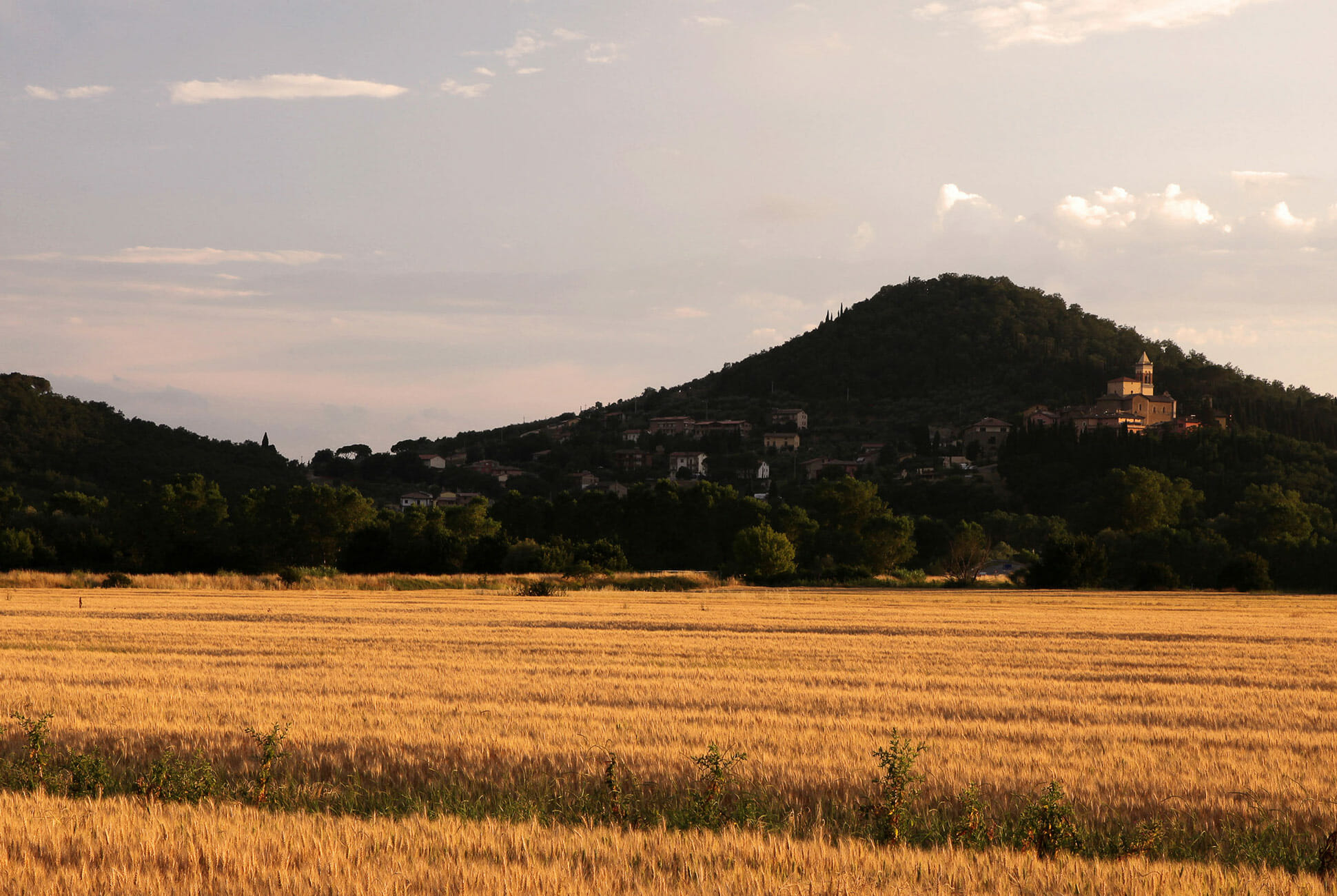
Solomeo, Italy
While Brunello Cucinelli offers a wide range of apparel and accessories for men and women, the brand is still deeply rooted in cashmere knitwear. Priced in the thousands of dollars, these garments showcase the top-tier sustainably harvested fibers and detail-oriented Italian manufacturing. (If a sweater with a four-figure price tag gives you sticker shock, it’s worth noting that the brand’s operating margin is 13.8 percent, noticeably lower than Bloomberg’s average of 17 percent for the luxury market. That means customers are getting more for their dollar, but the product speaks for itself — these sweaters are investments designed to last for decades.)
With his company, Cucinelli has proven that capitalism and human dignity aren’t mutually exclusive. A profitable company can and should look after its workers and give back to the community. It is possible to deliver consistent growth without sacrificing a product’s quality or a worker’s quality of life. So, simply calling Cucinelli enlightened is something of a disservice — he’s a man of action and a true visionary. For those interested in his perspective, Cucinelli uses the brand’s website to share his philosophical writings. Some of his published pieces include “The Decline of Consumerism in Favor of a Fair Use of Things,” “Humanist Artisans of the Web” and “Address to the Masters of Labour.”
But for those in Solomeo, Cucinelli’s vision is downright tangible. In 2008, he opened the Forum of the Arts, a set of four spaces — the Aurelian Neohumanistic Academy, the Garden of Philosophers, the Amphitheatre and the Theatre Cucinelli — all built by Umbrian master craftsman. Five years later, he founded the Solomeo School for Arts and Crafts, which trains young people in traditional trades like tailoring, agriculture and masonry (students receive monthly wages while attending classes). This year, his Project for Beauty completed the replacement of abandoned factories with four large parks. One space, the Park of Dignity, features a monument crafted with ancient techniques emblazoned with the words “Tributo alla Dignità dell’Uomo” (Tribute to Human Dignity).
As the brand’s 40th year draws to a close, we had the chance to catch up with Cucinelli in the midst of a busy travel month. As thoughtful in word as action, he took the time to reflect on the changing luxury space, the importance of the arts and the future of his company.
Q: Your brand was initially started with a range of vibrant colored cashmere sweaters. How has the brand changed as it’s added products and categories? Is the aesthetic codified now or is it still evolving?
A: Our collections have been evolving year after year and in my opinion, that is one of the most important things to keep the brand relevant. Product is a constant focus for our company. To stay true to the aesthetic of the brand but continue to bring more creativity to our clients with innovation on materials, colors and design.
The core of our business is still knitwear, which represents our roots and tradition, but bringing new product categories has allowed us to give the brand a more complete vision of luxury lifestyle for both men and women.
Q: There’s an ever-increasing number of new clothing companies, many of which claim to have a brand after simply putting a logo on a t-shirt. What is missing from this perspective and what does it mean to be credible and authentic in 2018?
A: Anyone who has launched a new brand or collection knows how much work and focus is needed to be invested in a new line of product in this crowded environment. I would say, you have to be very clear with your direction, your branding story and your production practices. It is no longer enough to simply have a nice idea and put it in the market because the competition is so vast. You must understand what the needs are and how you can improve the experience of a potential client with your product and service.
In luxury, in particular, many companies produce items with impeccable quality but the production method and social accountability have to also be in line with the position of their collections. For us, it has always been imperative to keep all production in Italy and mostly in our region. This has given us a chance not only to have a closer eye on quality control but also to support the local workforce and the region with philanthropic initiatives.
Q: Thanks to the internet, transparency is becoming more important than ever for brands. Does this increased transparency add to credibility?
A: I often tell my team that the internet is an incredible equalizer and I do believe it adds to the credibility of a brand if it is willing to maintain integrity and transparency in all its practices.
Q: While this technology has limitless possibilities, it has also become a crutch for many people. What is the path forward with technology — do you see it as resistant or symbiotic?
A: I believe that we are in a truly golden age. There is a beautiful expression by Voltaire where he says: “If you do not accept the changes of your time, perhaps you will miss the greatest part.” Let’s use the most innovative technologies the universe has given us, but let’s use them in a considerate way. We should try an advance as if we were humanist artisans of the web. We must start from the joy of life, from respect, from humanity, because the most important thing in life is having respect for other people. Especially for those who might think very differently from you.
Q: Do you still see cashmere as the antithesis of disposable fashion, something that never dies? What do you think of the range of brands offering inexpensive cashmere sweaters priced at $100?
A: I don’t like to judge others on their choices of manufacturing. For my company, I am still a firm believer in cashmere as a wonderful expression of quality and timeless appeal. It is a noble natural material and, when sourced and treated with the highest regard, can last in your wardrobe for generations.
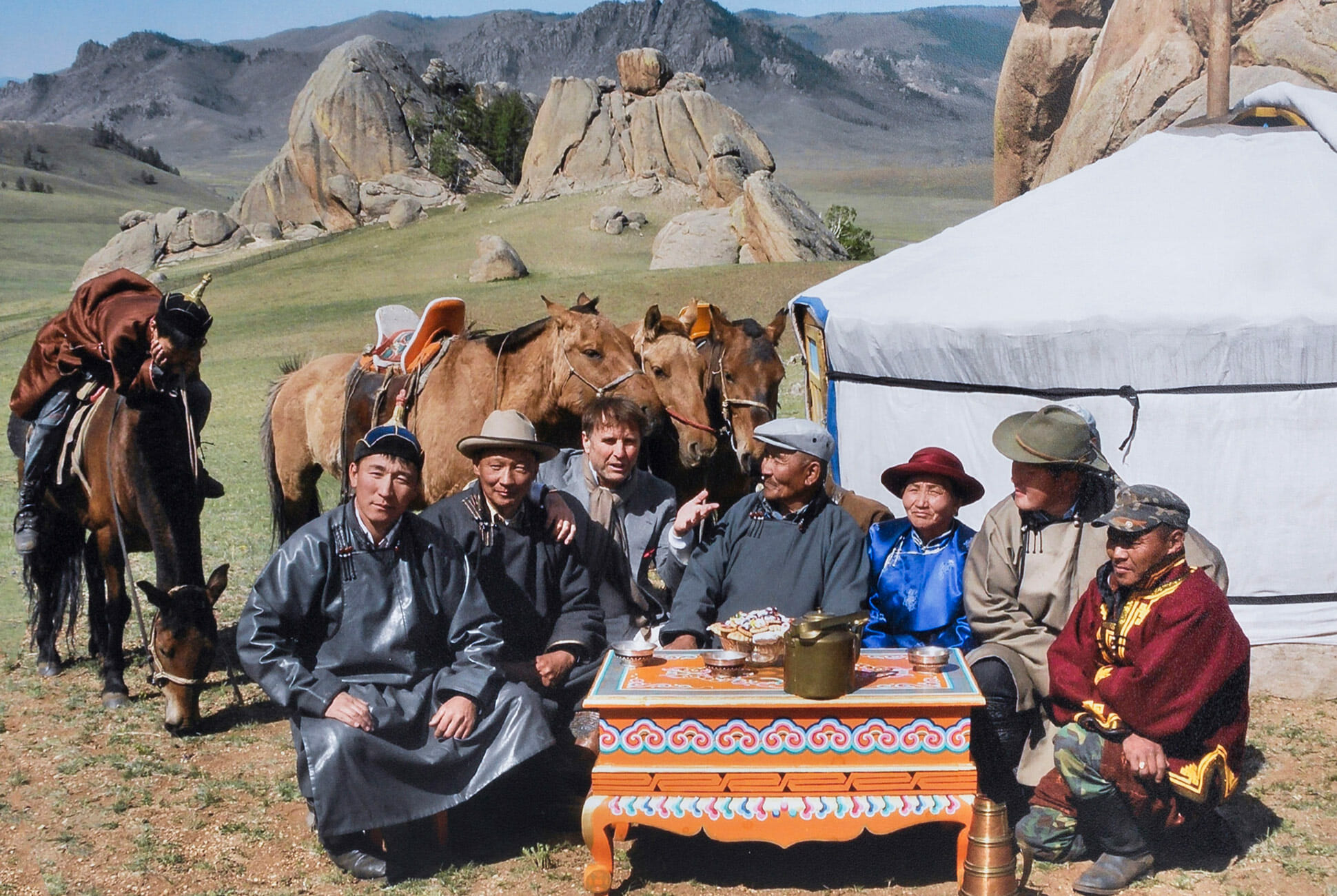
Cucinelli in Mongolia where he sources cashmere.
Q: Since you started your brand, how has the luxury space changed and how have you reacted to remain successful?
A: We have stayed consistent with our vision and have tried to work closely with our partners to strengthen our relationships and grow together in key markets. The addition of e-commerce and digital communication have allowed us to bring to life the company’s message through new mediums and we are continuing to develop more content to keep the conversation constant with our final consumers.
We believe that luxury today is more focused on transparency and social responsibility, which allows for a much-needed infusion of spirituality in business.
Q: How would you define luxury in 2018?
A: I would call it “exclusive luxury” which is the testament of an evolving consumer, who is sophisticated and receptive not only to quality but also to the production process and the sustainability, dignity and ethics of the manufacturer.
Q: Is it possible to live a life that doesn’t cause others to suffer? Many products deemed necessary in today’s world — cell phones, cars, clothing — are made at the expense of other people. How do we reconcile that?
A: I believe in quality and beauty but I think that quality cannot exist without humanity.
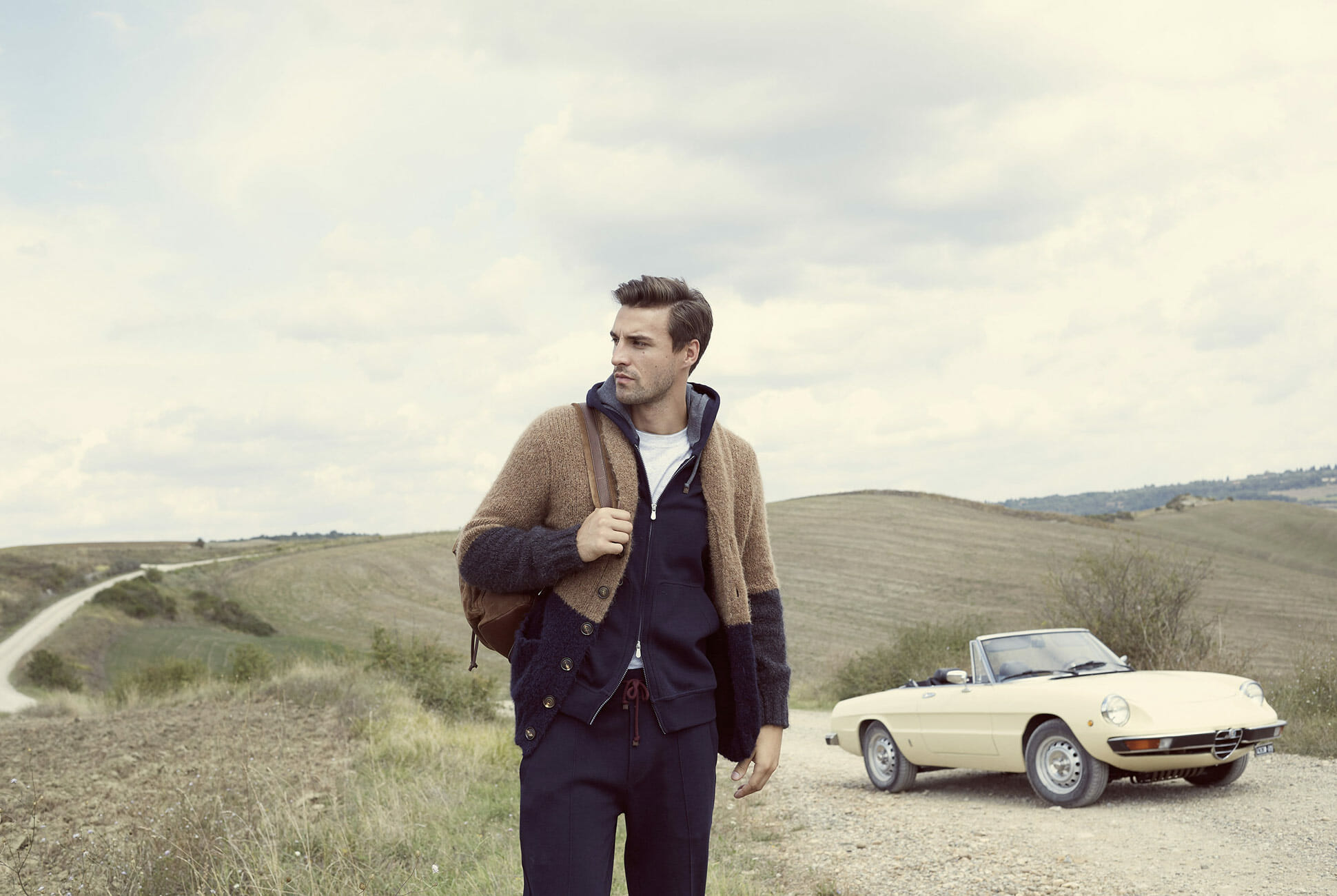
While the brand has expanded to offer tailoring and sportswear, knitwear is still the foundation of each season.
Q: You frequently reference great thinkers when explaining your perspective on business. Are any thoughts resonating with you now more than earlier in your career?
A: I am inspired by many great minds and I believe one must always respect the thinkers of the past and embrace the new generation of trailblazers shaping our world for those who will come after us.
One thought that resonates with me now more than ever as our business grows is one from the great thinker, Kant, who once said: Act in such a way that you treat humanity, whether in your own person or in the person of any other, never merely as a means to an end, but always at the same time as an end. Every rational action must set before itself not only a principle, but also an end.
Q: What would you recommend the next generation of leaders read?
A: The most inspirational book and one that I would recommend for the future generations of great minds is Memoirs of Hadrian by Marguerite Yourcenar.
Q: In what sense do you consider yourself a guardian?
A: I believe that if we assume a role of guardians, we will feel the responsibility to protect and preserve what is around us. When we are owners, we have a different relationship with our territory, for example.
To be a custodian is to understand that you have the responsibility, for the parenthesis of your life, to nurture and care for the land and people in our community. We can do this in small ways, by taking care of our homes or expanding our vision and helping take care of shared spaces in our towns and cities.
Q: How have you balanced capitalism’s constant growth model while preserving human dignity? How can other companies learn from your success?
A: I imagined a company based on the principles of humanistic capitalism, where industry embodies the most ancient forms of ethics and places the strongest value on its people. According to this concept, profit shall not involve harm or injury to people or things, and part of the revenue should be devoted to any initiative that could concretely improve the condition of human life.
The human being should remain at the center of any production process, because this is the only way to restore dignity and we must firmly believe that quality cannot be separated from humanity.
Investing in your people, their working conditions and wellbeing will have a return in creativity, loyalty and a sense of community that will strengthen the overall operation.
Q: Can you explain your thoughts about gracious growth?
A: I refer to gracious growth as a definition of sustainable growth plans that allow a company to have a steady growth into a solid future, because it follows a careful distribution strategy, quality control and creativity without feeling pressured by outside forces to overextend its capabilities and harming its values.
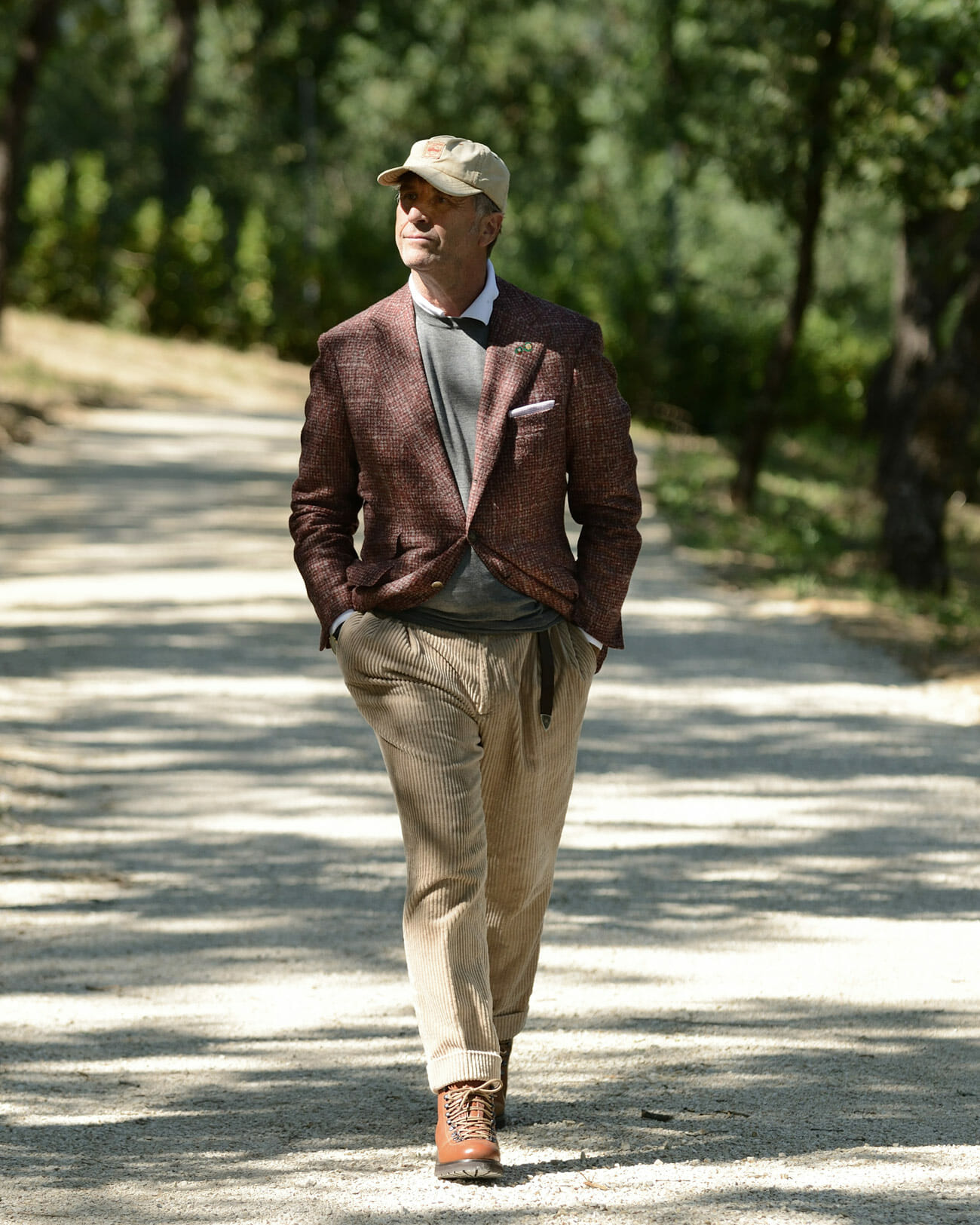
Q: How do respect and a focus on human dignity empower workers and help your company? Is it an employer’s job to encourage workers to look after their souls, or is it enough to just respect work-life boundaries?
A: What all humans have in common is a need for dignity and work has the ability to give this to people.
Dignity generates responsibility, responsibility generates creativity. According to many thinkers, including Nietzsche, creativity develops its roots during childhood. It is important to try and keep some of that childlike mentality to keep the ability to dream and laugh. I try to keep this spirit in my company.
We are creative in our tasks, our ideas are bold, yet we are prudent and moderate when we test them. Even moderation is the result of internal balance; it’s born of harmony and proportion. I think the employer should lead by example and show how important the company values are in his life first.
Q: Why have you focused the efforts of the Brunello and Federica Cucinelli Foundation on Solomeo and not widened the scope? Is it to set an example of what’s possible?
A: Solomeo is the town where my wife Federica was born and raised. We started our company here and we wanted our Foundation to be close to us in order to carry through the vision of the restoration projects we always dreamed of.
I am deeply attached to my region, but thanks to the international scope of the company we have been able to bring many international visitors to the area who have had a chance to experience firsthand the village life and also how it is possible to commit to an area and develop it with care through the profits of a business.
I think what we have managed to create in Solomeo is a concept that could be easily translated in other parts of the world, if the commitment from the private sector connects with local government, making a conscious effort to improve the natural beauty of a place.
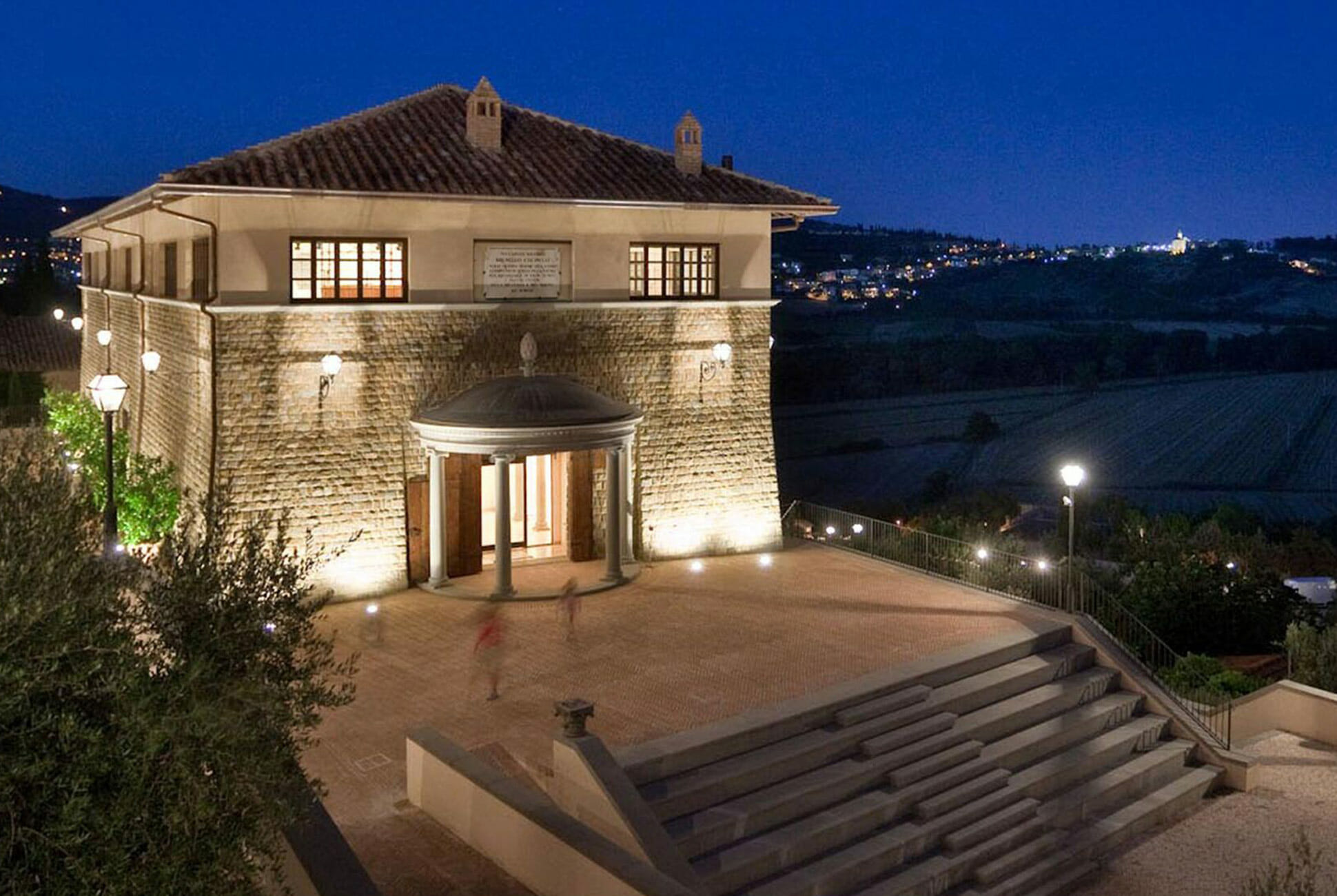
The Theatre Cucinelli in Solomeo.
Q: You’ve invested in the Theatre Cucinelli in Solomeo in a time when many Western countries are losing support for the arts. What place do theater and music have in today’s world?
A: We built a theater in 2008 respecting the architectural values of the town, making a structure that would reflect the neo-classic design of more ancient theaters.
We wanted to create a place to discuss, hold debates and re-enact the polemos, an instrument to instill humanity that was so dear to Heraclitus. Solomeo, as a small, minuscule Athens. We wanted to revive the Attic spirituality but at the same time we wanted to preserve the small life of the village where we lived.
Since the inauguration night, we have become a part of the Umbria theater district and have hosted a variety of wonderful artist from Ludovico Einaudi the first evening we opened to more recently Peter Brook, John Malkovitch, Isabelle Dupert.
People need beauty and art to elevate the spirit.
Q: How has the value of jobs and work changed since you started the company? How are you empowering young people to take on traditional crafts?
A: I think my generation of parents made a mistake when talking to children, treating work as a punishment of sorts. We said to them, “If you don’t study then you will have to work.” This affected a few generations of talented people who might have picked up industries of craft instead of desk jobs trading tradition for an apparent security in their future.
I believe technology is important, but we cannot forget about all the wonderful jobs where only the human hands can make a difference. We have to preserve as much as possible the trades that are handmade and where human creativity is necessary because in the future this will be increasingly more important, as we head to a more machine-focused life.
Q: In the U.S. we’ve seen skilled labor decline and whole industries vanish within generations. Is it possible to nurture and grow these trades after they’re lost?
A: I believe in combining the beauty of the past with the beauty of the future and this can bring back those crafts that you mention above.
Until now I have been a man of my time and I have tried to be guided by my soul. I tried to act according to heart, courage and prudence. Since I became an adult all my efforts have been focused in bringing some good to humanity. As far as work is concerned, I have made a conscious commitment to never produce anything that directly or indirectly can cause harm.
I am still working today with the same passion as when I started my company 40 years ago, and I look forward to the years to come, focusing on the values that we have made a priority every step of the way: beauty, truth and dignity.

